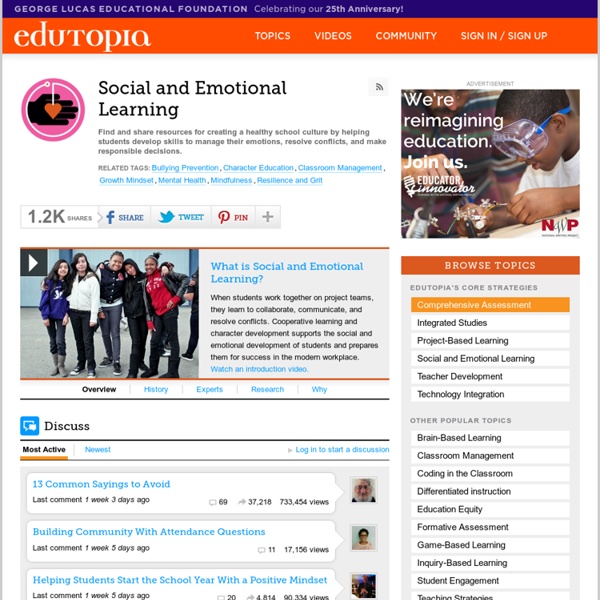



http://www.edutopia.org/social-emotional-learning
Related: Emotional & social developmentGiving Good Praise to Girls: What Messages Stick How to praise kids: It’s a hot topic for many parents and educators. A lot of the conversation around it has stemmed from studies by Carol Dweck, professor of psychology at Stanford who has been researching this specific topic for many years. “My research shows that praise for intelligence or ability backfires,” said Dweck, who co-authored a seminal research paper on the effects of praise on motivation and performance. Our Story – from 2010 to present day « GROW Who we are? GROW is the nationwide youth development program that represents a long term, non-formal educational engagement designed to improve the quality of education in Romania. Organized by Scoala de Valori (School of Values) in partnership with AIESEC, GROW project addresses high school students in Romania (age 14-18). The program offers high school students a professionally designed educational curriculum that complements the formal education system.
How Important is Grit in Student Achievement? Culture Teaching Strategies When it comes to high achievement, grit may be as essential as intelligence. By Emily Hanford, American RadioWorks Search Results As technology accelerates our lives, many of us feel an urgent need to slow down. One seductive solution: A secular sabbath. Pico Iyer makes the case, in this meditative excerpt from his new TED Book, The Art of Stillness: Adventures in Going Nowhere Please Don't Touch Me! {Dealing with Anxiety in Kids} As the holidays approached and we were getting ready to visit family and friends, I was tempted to create a festive and sparkly sign to hang around my daughter's neck. As we visited a new-to-her preschool last week I wanted to do the same thing again. I wanted to create one that could be seen from the front and one that could be seen from the back. The sign I wanted to make would've said, "Please don't touch me," "I am really overwhelmed right now" or "I am really nice if you give me some time to warm up." Another main sign that I'd love to hang on her neck would say, "Be kind. I'm trying to hold it together."
Find your Masters ...with MASTER AND MORE! Undergraduate students, graduates and young professionals who are looking for a Masters have a broad range of study programmes to choose from. MASTER AND MORE will help you make the right decision! How a Bigger Purpose Can Motivate Students to Learn Jane Mount/MindShift A few years ago, psychologist David Yeager and his colleagues noticed something interesting while interviewing high school students in the San Francisco Bay Area about their hopes, dreams and life goals. It was no surprise that students often said that making money, attaining fame or pursuing a career that they enjoyed were important to them. But many of them also spoke of additionally wanting to make a positive impact on their community or society — such as by becoming a doctor to take care of people, or a pastor who “makes a difference.”
PhD Studies / Tallinn University Tallinn University offers the following English-based PhD programmes: Academic Requirements Doctoral Level (PhD) applicants must have a research MA Degree or equivalent qualifications and experience. A doctoral programme requires considerably more original work than a research Master's programme. The thesis should provide evidence that the candidate has not only made a substantial original contribution to his/her field, but also that he/she has in-depth knowledge of the specific area in which he/she has worked. How a Shoe Can Teach Responsibility How a Shoe Can Teach Responsibility By Marjan Glavac closeAuthor: Marjan Glavac Name: Marjan GlavacSite: Marjan is currently a gr.6 home room teacher at Wilfrid Jury Public School in London, Ontario, Canada where he resides with his wife and two children. For more information about Marjan Glavac, his books, keynotes, training and seminars, visit him at his site at Authors Posts (51) thebusyeducator.com